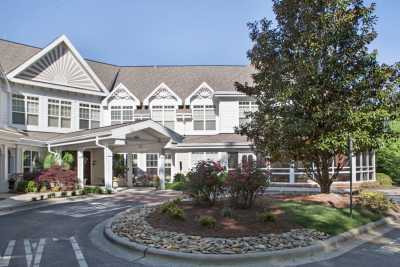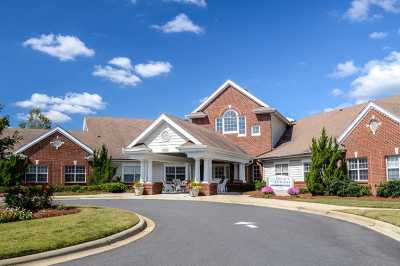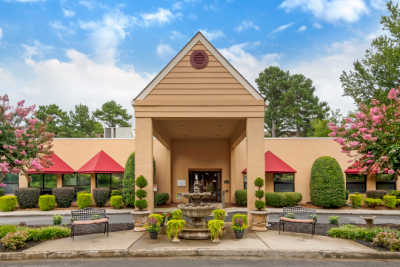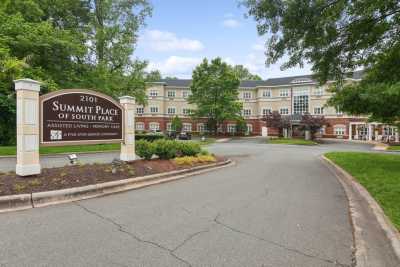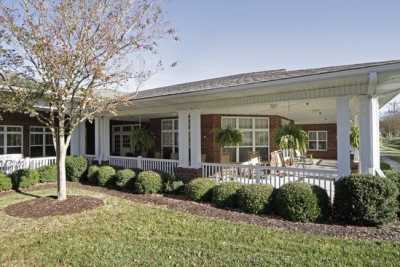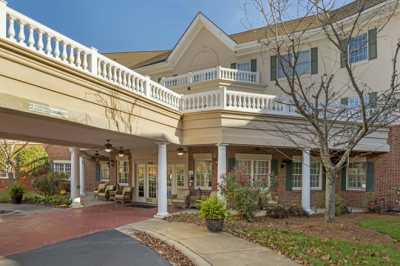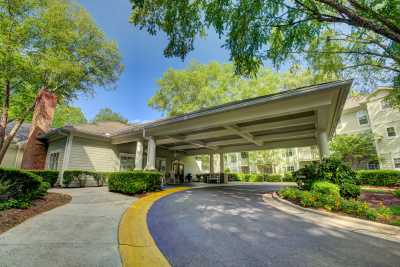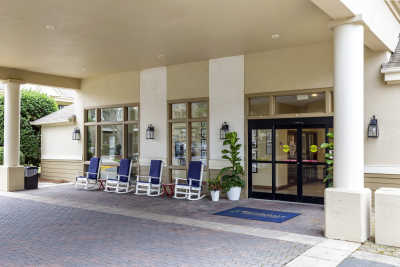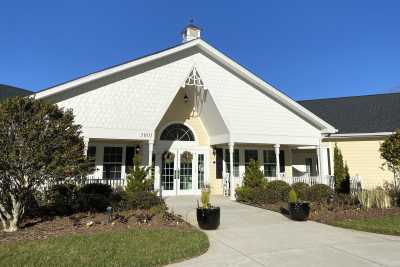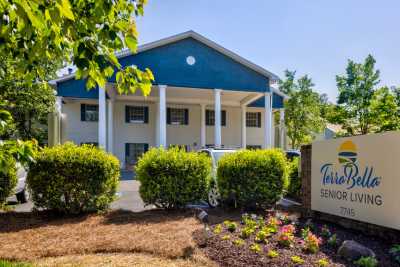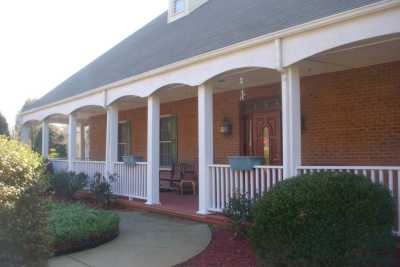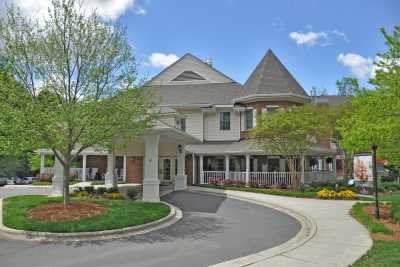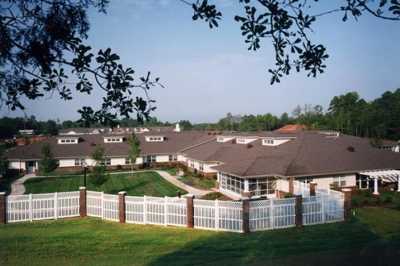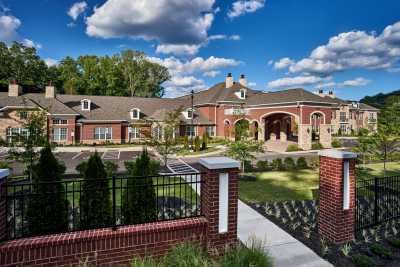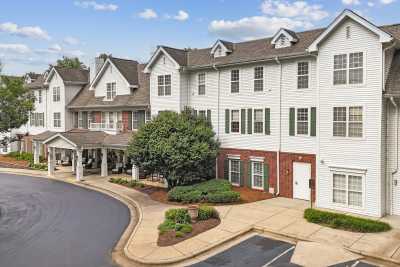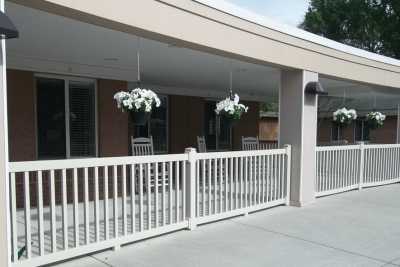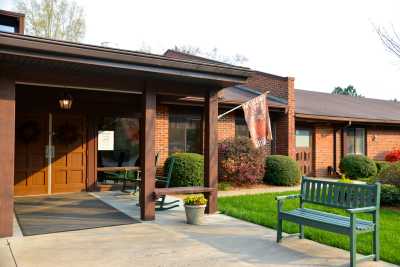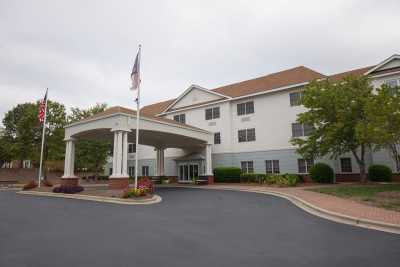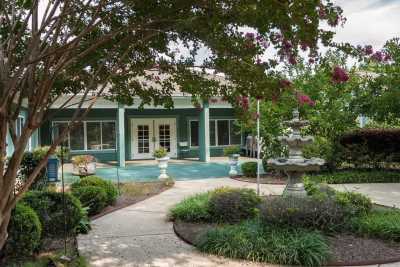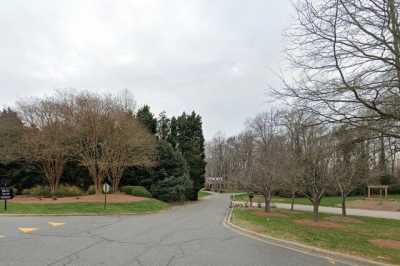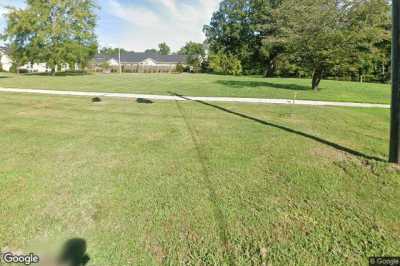
10 Best Assisted Living Facilities in Charlotte, NC
Commonly called the “Queen City,” Charlotte boasts many attractive amenities that include a reigning arts and culture scene, impressive dining options, and magnificent outdoor spaces. The thriving metro also boasts several assisted living facilities that make it easy for seniors to live like royalty. A Place for Mom partners with 17 assisted living facilities within a 10-mile radius of Uptown Charlotte. These communities offer perks for seniors that include palatial living spaces, access to supportive services, and regal amenities.
When it comes to assisted living, Charlotte, North Carolina, has a wealth of options to choose from. Sifting through so many options can be a dizzying experience, which is why we’ve fashioned this guide to assisted living in Charlotte. We organize our 2022-2023 proprietary data from in-network assisted living partners in Charlotte, sharing our top-rated communities with reviews from real residents. The guide also outlines the types of facilities you can expect to find in the area and a breakdown of local costs and senior-specific resources. You’ll also get a full rundown of North Carolina assisted living laws and regulations.
Charlotte Assisted Living Facilities | 810 Reviews
It's been a good experience overall. have been pleased with the service levels. Food is pretty good. Clean facility and the help has been very good.
My mom was in the memory care area. The staff was very caring and friendly. The facility was clean and well maintained. The food was very good (except the veggie burgers). I would recommend this facility to...
Clean, well organized, lots of activities and she loves it. The location of town is not the best but being a gated community it is safe an d prices are good

It had a full bathroom including shower in the room. The faculty is very nice. We are also impressed with all the planned activities and [name removed]is making friends and enjoying a social life again
My only point of reference is that my mom is considerably more happy than when she was at the other facility. Loves the food, staff and it was still close to our house.
The staff is very caring. Facility is attractive but still inviting and comfortable. My family chose Brookdale South for my father and step-mother.....out of several attractive options.
Merrywood on Park is a great place. The apartments are spacious and clean. The staff is very responsive to all issues. Everyone is super friendly and helpful—employees and fellow residents. My dad enjoys...
Dining room dishes glasses Utensils often dirty / lipstick. PT referral for dad never processed /? Breakdown x 1 month . What's standard? Admin - listened to mom w feedback . No major changes done....
Administrative staff could be more present, available and intentional with procedures of move-in and daily protocol communications. Based on the experience we have had so far, we would absolutely recommend...
It is not particularly well-suited for those with language deficits who do not have significant cognitive deficits. The staff was very nurturing.
Our free advisors can help
- Compare local facilities
- Determine care type
- Schedule tours
- Evaluate pricing
The facility, administrator and staff exceeded my expectations. They were so kind and accommodating to my Dad. They were genuine and provided excellent care. The community was inviting and beautiful. It...
[name removed] gave the utmost professional presentation offered to me and explained everything of what Charter Memory care had to offer for my loved one. Other facilities failed at the 24/7 assistance...
There were some issues at first - staff turnover and pharmacy they were using - but they have a new executive director and she has really turned things around.
I was happy with the layout and upkeep of the facility and my mom had friends. We felt she was safe there. I wanted to see some improvements in the meal service, the quality of the food and the lack of...
All the staff at Brighton Gardens have made sure to understand my mom’s needs, from first contact to the present. They listened about budget, lifestyle and care needs and found the perfect plan. The...
East Towne has been a great find for a place for my Mom. They take excellent care of her and she has adapted well to an assisted living facility because they made her feel welcome and friendly.
There are not enough words to describe Carmel Hills! It is the most wonderful loving place. My Mother lived there for 14 months and was taken better care of than I could ever imagine. The people that work...
Dining room has been closed off and on due to staffing issues. Activities offered include bingo, holiday parties, etc. They had a price raise of 10% since the beginning of 2022. That was a large increase....
The entire staff were easy to work with and always very nice. They have healthy good food. They offer daily activities. The community is clean and I would recommend it.
My in-laws live at another Spring Arbor location, so when they bought something near our home, we had to go in for a tour! They are making a ton of improvements to the community and the team is so welcoming....
My mom and I needed in home help after she fell and broke her shoulder. This was our first time with using an in home facility and we could not have been more pleased. We had an awesome caretaker and never...
Our methodology
How we rank order the Charlotte community options above
We developed a proprietary recommendation system that orders Charlotte community options based on factors we know are important to seniors and their families:
- Proximity to your search location
- Availability of recent, high-quality reviews
- The amount of detailed community information available
Where we source our information
14,000+ communities
We collect proprietary data from our network of 14,000+ senior living communities in the U.S., with regular refreshes of data and information
350,000+ reviews
We have 387,000+ reviews from senior living residents and family members that provide first-hand accounts about senior living communities
- Costs of assisted living in the Charlotte area
- What families are saying about assisted living in Charlotte
- How people pay for assisted living in Charlotte
- Understand North Carolina laws and regulations for assisted living facilities
- What to expect from assisted living in Charlotte
- Charlotte assisted living services and amenities
- Explore senior care with confidence
- Unfamiliar with Charlotte? Highlights for seniors
Costs of assisted living in the Charlotte area
Charlotte assisted living facilities cost an average of $4,900 per month, according to A Place for Mom’s proprietary data from 2022.[01] However, costs can vary from place to place depending on a community’s amenities, services, and location. Reflected in the number above is the total cost, including all of our Charlotte partner facility’s add-on services or fees. Most of our partner assisted living facilities include the following in their monthly rent rate:
- Transportation
- Parking fees
- Additional care
- Dining services
- Housekeeping services
- Common areas and courtyards
- Personal laundry and/or dry cleaning
- Coordinated activities and outings
- Landscaping and maintenance services
There are some additional fees you can potentially come across at most assisted living facilities. We provide some examples of what you may encounter at our partner communities within 25 miles of Charlotte’s city center below.
- Monthly pet fees (which can run high if pet care is included)
- Monthly medication management fee
- One-time entrance fee
The numbers below represent baseline starting costs of other assisted living facilities in the area. These figures are best used to compare prices of facilities across the greater Charlotte area.
Average monthly cost of Assisted Living in Charlotte, NC vs. nearby cities
Average monthly cost of Assisted Living in Charlotte, NC vs. the state and national average
Average monthly cost of Assisted Living in Charlotte vs. other types of senior living
Median monthly costs of Assisted Living in Charlotte, NC by room type
Average cost of Assisted Living in Charlotte over time
What families are saying about assisted living in Charlotte
Recent reviews for assisted living in Charlotte
Terrace Ridge Assisted Living in Gastonia, NC
TerraBella Little Avenue in Charlotte, NC
Brookdale South Charlotte
Reviews mention these favorite features of communities
Charlotte review score based on 235 family reviews
This proprietary review score is based on 235 reviews of 29 Charlotte assisted living communities. All reviews were submitted in the past two years by verified community residents and family members.Charlotte review score compared against nearby cities
Review subcategories for Charlotte assisted living
When assisted living residents and family members submit a review on our site, they rate each community on categories such as cleanliness, activities, meals, and more. The chart below is based on 235 reviews of 29 Charlotte assisted living communities. This chart helps you compare Charlotte resident and family assisted living satisfaction rates against national averages. Use it to assess your needs and develop criteria for your own search. If you know that one of these categories is important to you or your loved one, our senior living advisors can help you find communities to match your needs.How people pay for assisted living in Charlotte
When it comes to paying for assisted living in Charlotte, seniors and their families have a variety of options to choose from. In some circumstances, families can source from their private and public funds to pay for the costs of assisted living in Charlotte.
You’ll learn about the options seniors or their families might have on hand to cover costs of assisted living. We also outline several public resources, such as Medicaid, Medicare, and VA benefits, that may be available to help you pay for care services.
To get their ideal assisted living environment, seniors or their families typically dip into their personal funds to pay. This can be savings built up over the years, retirement, pensions, and any income or assets the senior has available.
It’s also worth noting that some forms of income are taxed differently in North Carolina. While Social Security income isn’t taxed in the “Tar Heel State,” other forms of retirement income are taxed at the state’s 4.99% income tax rate (as of 2022):
- Pensions
- IRA/401k withdrawals[02]
Depending on the cost of care needs over time and an individual’s financial situation and assets, the private pay methods below could fully fund the costs of an assisted living facility in Charlotte. Seniors and families might want to consider all possible ways to fund their ideal senior living situation.
Note that long-term care insurance policies can differ in what services are covered. You’ll want to check directly with your provider to see what services are covered. The same goes for life insurance. You may be able to sell or surrender your life insurance policy, but you need to consult with your insurance provider directly first to see what’s possible.
Qualified veterans and their spouses in Charlotte may be able to pay for assisted living costs with federal benefits from the U.S. Department of Veterans Affairs (VA), like the pension and the Aid and Attendance benefit. The North Carolina Department of Military and Veteran Affairs (DMVA) and other local resources may help residents attain these benefits.
It can be a lengthy and complicated process to find and apply for VA benefits. Before beginning your application, get connected with a veterans service officer (VSO) who can help you maximize your benefits and help ensure your application is accepted. Some local organizations within Charlotte can also provide assistance with VA benefits and claims. You can also contact the Mecklenburg County Community Support Services office for help with getting access to veterans services and to get in touch with your local VSO.
Nonprofit veterans advocacy groups, like Disabled American Veterans (DAV) and Veterans of Foreign Wars (VFW), can help veterans file for benefit claims. Another resource is NCServes, which can help provide benefit navigation and connect North Carolina veterans and families to local resources across the state.
Charlotte’s veteran population, according to the U.S. Census Bureau
About 22% of Charlotte veterans are age 75 and older, per the U.S. Census Bureau.
Resources for Charlotte veterans
Veterans Service Officers (VSO) contacts
Valerie C. Woodard Center
3205 Freedom Drive, Suite 2000, Entrance D
Charlotte, NC 28208
Phone: 704-336-2102
NC Medicaid is North Carolina’s Medicaid program, which can’t be used to pay for the room and board costs in assisted living facilities. However, some services may be covered through the home- and community-based service programs offered through NC Medicaid’s Long-Term Services and Supports (LTSS).
LTSS is intended to help provide support to older adults and people with disabilities. Eligible recipients have access to a variety of care services that help them live more independently, which can be provided in a community setting like an assisted living facility. Find out more about the services provided and eligibility requirements for LTSS below.
Personal care services
Eligible Medicaid beneficiaries can receive personal care services (PCS) in a residential facility, such as an assisted living community. These services provide help to individuals who need help with activities of daily living and struggle to do the following independently:
- Eating
- Getting dressed
- Transferring themselves
- Going to the bathroom
- Bathing and/or showering[11]
To qualify, individuals need to already be enrolled in NC Medicaid.
Community Alternatives Program for Disabled Adults (CAP/DA)
The Community Alternatives Program for Disabled Adults (CAP/DA) helps Medicaid-eligible beneficiaries remain in or return to their community or home as an alternative to placement in a nursing home. The waiver program is aimed at helping medically fragile Medicaid recipients who would otherwise be institutionalized if services weren’t able to be provided in a community- or home-based setting. Here are some of the home- and community-based services that are covered:
- In-home caregiver
- Community integration and transition
- Specialized medical supplies
- Personal emergency response services[12]
Program of All-Inclusive Care for the Elderly (PACE)
The Program of All-Inclusive Care for the Elderly (PACE) provides a range of long-term care services to frail older adults living in a community setting. The program helps seniors remain in their chosen community while receiving the care services they need, rather than having to move to an institutional setting.
Individuals must meet the following requirements to be eligible for PACE services:
- Be age 55+
- Meet a nursing home level of care
- Live in a PACE organization service area
- Be enrolled in Medicaid and/or Medicare, or able to pay with private funds
- Meet NC Medicaid’s financial eligibility requirements for long-term care
- Able to safely live in their community without compromising their health[11]
PACE of the Southern Piedmont can provide more information about PACE and resources in the Charlotte area. You can also contact the NC PACE Association to find out about PACE services in the state and find a PACE program near you.
NC Medicaid help
The North Carolina Medicaid Division of Health Benefits has several contacts on its website that can navigate through NC Medicaid policies. You can also contact the NC Medicaid Ombudsman for questions about NC Medicaid, where to find community services, or if you aren’t getting the care you need. You can also contact your local Area Agency on Aging for help accessing long-term services near you.
You can apply for NC Medicaid and other benefits online using the ePass website. You can also apply in person at your local Department of Social Services office.
Resources for Charlotte residents
North Carolina Medicaid Division of Health Benefits
NC Medicaid contacts
Phone: 888-245-0179
NC Medicaid Ombudsman Program
NC Medicaid ombudsman website
Phone: 877-201-3750
Mecklenburg Department of Social Services (DSS) – DSS main office
Adult Medicaid questions
301 Billingsley Road
Charlotte, NC 28211
Phone: 704-336-3000
Centralina Area Agency on Aging
Long-term senior services and support
10735 David Taylor Drive, Suite 250
Charlotte, NC 28262
Phone: 704-372-2416
PACE of the Southern Piedmont
Areas served
6133 The Plaza
Charlotte, NC 28215
Phone: 704-887-3840
NC PACE Association
How to enroll in PACE
Phone: 919-428-7118
Medicare is a federal program that provides health insurance for older adults age 65 and older, as well as those under age 65 with disabilities. Medicare doesn’t pay for a majority of services provided in assisted living, like support with activities of daily living that are considered custodial care. Additionally, room and board expenses of an assisted living community aren’t covered by Medicare.
In some instances, Medicare may pay for short-term care services if there’s a medical need for the services and it’s provided by a certified health professional. Some examples of these services that may be covered by Medicare include:
- Inpatient hospital stays
- Skilled nursing care
- Prescription medications
- Medical supplies and equipment
- Rehabilitation following surgery
You can locate more information about Medicare eligibility and enrollment on the Medicare website. You can also enroll in Medicare and find more information on Medicare by contacting the Social Security Administration.
North Carolina also offers free, unbiased Medicare counseling through the North Carolina Department of Insurance with the Senior Health Insurance Information Program (SHIIP). Trained SHIIP counselors are chock full of information about Medicare plans and can help you find and apply for your eligible Medicare Savings Programs.
The North Carolina Senior Medicare Patrol Program (NCSMP) is an educational program taught by trained SHIIP volunteers. The program is aimed at helping Medicare beneficiaries understand Medicare statements and benefits, so they can better identify and prevent Medicare fraud.
Charlotte Medicare resources
Medicare basics
Albemarle Building
325 N. Salisbury St.
Raleigh, NC 27603-5926
Phone: 855-408-1201
Understand North Carolina laws and regulations for assisted living facilities
In North Carolina, assisted living facilities — also called adult care homes — are defined as residences that provide round-the-clock personal care services.[06] Assisted living facilities in Charlotte are licensed and regulated by the Division of Health Services Regulation (DHSR), which operates under the Department of Health and Human Services (DHHS). You can find a full list of rules and regulations for DHSR agencies on the NC DHHS website.
All licensed North Carolina assisted living facilities are inspected annually to make sure communities are in compliance with rules like the following:
- Assisted living facilities must provide a minimum of three nutritionally balanced meals per day, with snacks available between meals.
- Assisted living facilities must coordinate at least 14 hours of planned group activities per week and offer at least one monthly outing to each resident.
- Assisted living facilities must provide personal care and supervision that’s under residents’ care plans and meets their individual needs.
- Assisted living facilities must develop a care plan for all residents, based on a resident’s initial assessment. It must be completed within 30 days of admission and revised following future assessments.
- Assisted living facilities must have a minimum of 10 hours per day available for visitations.[08]
Building requirements
North Carolina assisted living facilities must meet all building requirements in the North Carolina State Building Code and local zoning laws. Assisted living communities in North Carolina are also regulated for a facility’s physical environment. These regulations are in force to make sure residents have suitable and safe living arrangements. Some of these environmental regulations include the following:
- All recreation and dining rooms must have windows and be located off of a lobby or corridor.
- Hand grips must be provided in all tubs, toilets, and showers used by residents.
- Bedrooms must have a maximum occupancy of two residents.
- Facilities must have at least one toilet and sink per five residents.[08]
Additionally, assisted living communities must maintain plumbing, and electrical equipment. Facilities must also meet fire safety code requirements that include the following:
- Smoke detectors should be in every hallway and be no more than 60 feet apart.
- A fire alarm pull station should be installed within five feet of each exit.
- Smoke and fire detectors in every storage room, dining room, kitchen, and laundry facility.[08]
Resident admission requirements and assessments
Assisted living communities will generally have admission requirements for prospective residents. These are in place to make sure residents have the right amount of care and supervision in their assisted living community. By law, assisted living facilities in North Carolina can’t admit seniors who meet any of the following criteria:
- They need a ventilator.
- They have care needs that exceed the services the assisted living facility can provide.
- They require round-the-clock skilled nursing care.
- They have a communicable disease.
- They pose a threat to the health and safety of others.
- A doctor or physician determines placement in an assisted living facility isn’t suitable.[08]
Residents of assisted living facilities have to undergo a pre-admission assessment within 72 hours of moving into a community. Residents must complete an additional assessment within 30 days of admission and on an annual basis after. These annual assessments help identify any significant changes to a resident’s health status or abilities, like the following:
- Changes in mobility
- Impaired decision making
- A decline in two or more activities of daily living[08]
Residents found to have significant changes in their assessments will be referred to the appropriate health professional.
Residents’ rights
Residents should receive a copy of an assisted living facility’s policy upon move in that cover topics, like grievance policies and procedures, as well as contact information for the local Area Agency on Aging and ombudsman program. It should also have a declaration of residents’ rights, which includes facility standards, like the following:
- Residents have the choice to participate in community activities.
- Residents will be treated in a dignified manner that respects their individuality and privacy.
- Residents will receive care that’s in compliance with federal and state laws.
- Residents have the right to complain or voice their suggestions without fear of retaliation from staff.[09]
Reporting abuse
All staff members at assisted living facilities in North Carolina are required to report any resident abuse, and they may be subject to criminal charges or fines for failing to do so. To report abuse, you can contact the DHS Care Line or the local ombudsman office below.
North Carolina Division of Health Service Regulation (DHSR)
809 Ruggles Drive
Raleigh, NC 27603
Phone: 919-855-3750
Centralina Area Agency on Aging
525 N. Tryon St.
Charlotte, NC 28202
Phone: 704-372-2416
COVID-19 regulations for Charlotte assisted living facilities
As of February 2023, there are no statewide mandates or regulations for COVID-19 in North Carolina. However, COVID-19 and its variants are still a concern for high-risk populations. The North Carolina Department of Health and Human Services (DHHS) currently recommends long-term care facilities, like assisted living facilities, follow the latest guidance and data. To contact them regarding COVID-19 questions, you can dial 1-800-232-4636. You can also find the latest updates on the DHHS COVID-19 dashboard, which includes protocols on the following:

Vaccinations. Seniors, health care workers, and people with underlying medical conditions are strongly advised to stay up to date on vaccines and boosters.

Masking. Masks are recommended in indoor public spaces and may be required in high-risk or long-term care settings.

Staff safety. Staff should follow isolation and quarantine protocols established by the Centers for Disease Control and Prevention (CDC).
What to expect from assisted living in Charlotte
When it comes to assisted living, Charlotte is filled with magnificent communities designed just for seniors to find all they want out of life. Read on for some key features you can expect from assisted living facilities in Charlotte.
Palatial living arrangements
Many of our partner assisted living facilities in Charlotte offer a variety of layout options, which can range from private or semi-private studios to one- and two-bedroom apartments. Select communities feature kitchenettes with mid-size refrigerators and microwaves. You’ll also find accessible bathrooms with walk-in showers, optional private balconies, and oversized windows at many of our Charlotte in-network assisted living facilities.
Regal amenities
Marvelous amenities await seniors at our partnered assisted living facilities. Take an enchanting stroll through impeccably manicured grounds, where you may find charming courtyards and gazebos, raised garden beds, and serene fountains. Or, treat yourself to five-star amenities like on-site salons, state-of-the-art fitness centers, and chef-prepared meals. Other services and amenities include housekeeping, personal laundry, and transportation. Some communities even offer the convenience of delivery services on commodity items like toilet paper, tissues, toothpaste, and dental floss.
Robust social programs
Delight in the activities you love the most with tastefully appointed indoor common rooms available at most of our in-network assisted living facilities. The majority of our partner communities coordinate group outings to local senior hot spots. You can expect most assisted living communities to offer a wide-ranging social calendar with daily activities — from cooking clubs and art classes to yoga and brain fitness. Look forward to plenty of opportunities to simply mingle with friends at events like barbecues, birthday celebrations, holiday parties, and wine tastings.
Charlotte assisted living services and amenities
Availability of select care services in Charlotte assisted living
Availability of select dementia care services in Charlotte assisted living
Availability of select dietary accommodations in Charlotte assisted living
Availability of select dining options in Charlotte assisted living
Availability of select programs and activities in Charlotte assisted living
Explore senior care with confidence
Know where to start.
Identify the right care for your loved one with our free assessment.

See what you can afford.
Understand cost and payment for long-term care based on your loved one's needs.

Find top facilities for you.
Free, personalized guidance from our Senior Living Advisors can help you narrow your search.

Tour your favorite facilities.
Our free touring checklist can help you choose the right community.
Unfamiliar with Charlotte? Highlights for seniors
Number of seniors living in Charlotte age 65+
Percentage of seniors 65 and older within the Charlotte population living with grandchildren
Average retirement income for Charlotte seniors age 65 and older
Health care for seniors in Charlotte
Remarkable medical care and health services are widely available in Charlotte. We highlight some of the area’s top hospitals below.

CaroMont Health Regional Medical Center
CaroMount Health Regional Medical Center is just about 30 minutes outside of Charlotte in Gastonia, North Carolina. This acute care hospital features a cutting-edge surgical department that utilizes the latest technology and techniques that reduce pain and recovery times. CaroMount Health is highly acclaimed for patient safety and quality care, as well as its nationally accredited cancer center, a Level III trauma center, and exceptional cardiac care.

Atrium Health Pineville
Atrium Health Pineville is one of the country’s top cardiovascular hospitals, offering access to innovative cardiovascular care from its Sanger Heart and Vascular Institute. Atrium Health’s Pineville campus has direct access to specialized services that include robotic surgery and neuroscience. It also provides innovative cancer care and treatment through the Levine Cancer Institute with on-site surgery and radiation oncology available.

Novant Health Charlotte Orthopedic Hospital
Novant Health Charlotte Orthopedic Hospital offers an array of treatments and services ranging from advanced imaging to comprehensive rehabilitative therapies. It’s among the leading orthopedic hospitals in North Carolina and has received national recognition for its performance in surgical care, along with its joint and spine programs. Additionally, it features a total joint replacement unit, which provides complete support from pre-surgery consults to recovery.
Transportation for seniors in Charlotte
Around 82% of our partner assisted living facilities in Charlotte offer on-site transportation services to their residents.[01] Many find community transportation services offer the safest way to get to appointments and run errands.
For visiting friends and relatives, the Charlotte Area Transit System (CATS) has several bus and rail routes throughout the city. CATS also offers paratransit services to people who can’t access fixed routes because of a disability.
Additionally, the Mecklenburg Transportation System (MTS) has nonemergency transportation services available for eligible seniors in Charlotte. Read on to learn about some of their services and their unique eligibility requirements.
- Medicaid transportation utilizes the CATS bus services to take Medicaid-eligible seniors to medical-specific destinations.
- Veterans services transportation helps qualified veterans get to and from Charlotte medical clinics, as well as VA hospitals within North Carolina.
- Urbanized area general purpose provides nonemergency transportation for seniors age 60+ to locations within Charlotte that include beauty salons, grocery stores, and recreation centers.
- Elderly disabled transportation assistance helps seniors age 60 and older get to and from dialysis or chemotherapy treatment.[07]
Overall, Charlotte is a fairly car-dependent city, but it does offer access to public transportation options and some bike lanes. You can see how WalkScore ranks Charlotte for its walkability, public transit, and bike friendliness below. All scores are out of a possible 100.

Walk Score

Transit Score

Bike Score
Senior activities in Charlotte
For those seeking a big-city lifestyle with Southern charm, Charlotte is a darling city to call home. From the on-the-rise food scene to the unique culture, Charlotte has much to offer seniors.
Rich in senior-friendly activities
Many assisted living facilities coordinate outings into Charlotte — where residents enjoy activities like hitting the green at the local golf clubs, fishing at the area’s lakes, and visiting the Mecklenburg Public Library. Charlotte also has several senior centers where residents can meet and socialize with other peers in the community, learn new skills, and stay active.
Tree-mendous outdoor spaces
Charlotte boasts an impressive 45% tree canopy coverage and an abundance of lush outdoor parks and nature preserves. Beautiful lakes, flourishing gardens, and ample hiking trails are just a few qualities that make Charlotte’s outdoor destinations second to none. Grab your walking shoes and explore one of Charlotte’s gorgeous outdoor retreats:
A culinary kingdom
From barbecue, burgers, and seafood to exotic Peruvian cuisine, Charlotte’s dynamic food scene has plenty of mouthwatering options to choose from. Naturally, Southern food is king in the Queen City, but international cuisines can be found throughout the city as well among Charlotte’s food truck scene. The area also has plenty to sip on — with an impressive collection of craft beer and wine varieties from local vineyards and breweries.
A reigning arts and culture scene
Culture rules in Charlotte from the public art and murals to the world-class museums and venues. Residents and visiting friends and family alike can enjoy immersing themselves in Charlotte’s popular cultural attractions, which include the following:
Frequently Asked Questions
Morningside of Concord, Cadence at Mooresville by Cogir and Sunrise of Providence are the top-rated Assisted Living facilities near Charlotte, NC. These Assisted Living facilities received the highest rankings based on verified family reviews. See full list of communities.
The average cost of Assisted Living in Charlotte is $4,741 per month. This cost may vary based on location, amenities, floorplan, level of care and other factors.
References
A Place for Mom. (2022). A Place for Mom proprietary data.
SmartAsset. (2021). North Carolina retirement tax friendliness.
United States Census Bureau. (2021). Veteran status (S2101). [Data set]. American community survey.
U.S. Department of Veterans Affairs. (2022, October 12). Eligibility for veterans pension.
U.S. Department of Veterans Affairs. (2022, October 12). VA Aid and Attendance benefits and Housebound allowance.
NC Division of Health Service Regulation. (2015, November 20). An overview of adult care home regulation in North Carolina.
Mecklenburg County Government. Mecklenburg transportation system (MTS).
Licensing of Adult Care Homes of Seven or More Beds, N.C. Administrative Code § 10A NCAC 13F (1977 & rev. 2022).
City of Charlotte. (2019, February 04). Tree canopy assessment.
NC Department of Health and Human Services. (2022, September 06). Protecting each other from COVID-19.
State of North Carolina Department of Health and Human Services. (2022, February). Fact sheet LTSS service description and requirements.
North Carolina Medicaid Division of Health Benefits. (2022, November 03). Community alternatives program for disabled adults (CAP/DA).
United States Census Bureau. (2021). Population 65 years and over in the United States (S0103) [Data set]. American community survey.

More questions?
Ask an A Place for Mom local advisor at no cost.
- Matthews, North Carolina
- Waxhaw, North Carolina
- Cornelius, North Carolina
- Belmont, North Carolina
- Mount Holly, North Carolina
- Harrisburg, North Carolina
- Indian Trail, North Carolina
- Pineville, North Carolina
- Mint Hill, North Carolina
- Kannapolis, North Carolina
- Concord, North Carolina
- Gastonia, North Carolina
- Mount Pleasant, North Carolina
- Fort Mill, South Carolina
- Locust, North Carolina
- Lake Wylie, South Carolina
- Huntersville, North Carolina
- Tega Cay, South Carolina
- Weddington, North Carolina
- Davidson, North Carolina


